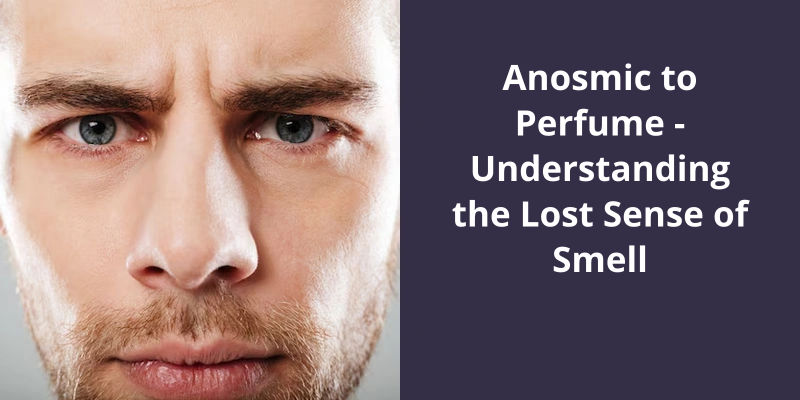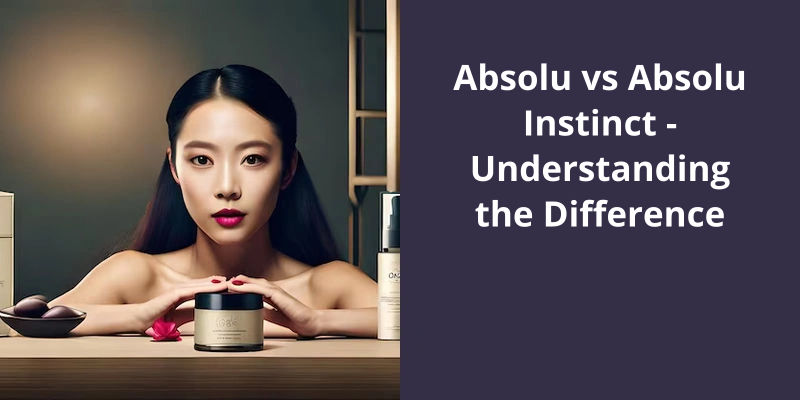Anosmic to perfume refers to someone who is unable to smell the scent of perfume due to a condition known as anosmia. Anosmia is the loss or absence of the sense of smell, which can occur for several reasons, such as injury, infection, hereditary factors, or certain conditions like chronic nasal sinus disease. Therefore, regardless of how strong or mild a perfume is, someone who is anosmic would not be able to distinguish it. This can greatly affect their experience and enjoyment of perfumes or scents in general. Despite this, far from being completely cut off from the world of perfumes, anosmic individuals can still enjoy or differentiate perfumes through their other qualities such as the tactile feeling on the skin or the sensation of heat or freshness that certain perfumes can provoke.

What Is the Structure of a Perfume?
The top notes of a perfume are the initial scents that you smell when you first spray the fragrance. They’re typically very volatile and evaporate quickly, leaving the heart and base notes to take over. These top notes are often bright, fresh and citrusy, and include ingredients such as lemon, bergamot and grapefruit. They’re meant to grab your attention and make a strong first impression, before settling into a more complex scent.
The heart or middle notes are the core of the fragrance, and become more prominent once the top notes have evaporated. They’re typically floral or herbal in nature, and provide the body and character of the scent. Common heart notes include rose, jasmine, lavender and sage. They’re generally less volatile than top notes, but still evaporate relatively quickly, usually within a few hours after application.
Finally, the base notes are the foundation of the fragrance, and are the scents that linger the longest. They’re typically rich and deep, and include ingredients such as vanilla, musk, and sandalwood. Base notes can last for several hours or even days after application, and help to give the fragrance it’s overall character and sense of depth.
In addition to these three main components, perfumes may also contain other ingredients such as fixatives, which help to extend the lifespan of the scent, and modifiers, which can alter the way that the fragrance smells on different skin types. The overall structure of a perfume is key to it’s success, as it determines how the scent will develop over time, and how it will interact with the wearers body chemistry.
By breaking down the scent into it’s component parts, it’s possible to better understand how a perfume will smell over time, and how it will interact with the wearers skin. Whether you’re a connoisseur of perfumes or simply someone who enjoys wearing them, knowing the olfactive pyramid is an essential part of understanding fragrance.
Different Types of Perfumes and Their Compositions (e.g. Eau De Parfum, Eau De Toilette, Etc.).
This topic covers the different types of perfumes available in the market, such as eau de parfum and eau de toilette, and their compositions.
Now that we’ve covered the importance of selecting the right perfume and applying it correctly, let’s dive into some extra tips that can help enhance the fragrance and make it last longer on your skin. One of these tips involves using petroleum jelly, particularly if you’ve dry skin. By applying a small amount of petroleum jelly to your pulse points, you can help retain the scent of your perfume and extend it’s longevity.
How Can I Make My Perfume Smell More?
Perfume is one of the most important accessories a person can wear. It’s the power to evoke certain emotions and can be the perfect finishing touch to an outfit. As much as we love to wear perfume, we also know that it can be a difficult task to make it last all day. Reapplying often can be tiresome and expensive, but there are a few tips and tricks that you can use to make your perfume smell more and last longer throughout the day.
One of the easiest ways to make your perfume last longer is to apply it to your pulse points. These are areas like your wrists, neck, behind your ears, and chest. When you spray perfume to these areas, the warmth of your body helps to release the fragrance, making it last longer. If youre wearing a low-cut top, you can also spray perfume on your chest.
Another way to make your perfume smell more is to layer it with other products. Many perfume brands offer body lotions and shower gels that are specifically formulated to complement their perfumes. Using these products can help to make your perfume smell stronger and last longer.
If you want to get even more creative with your perfume, you can make your own fragrance by mixing your favorite essential oils. Essential oils are concentrated plant extracts that come in a variety of scents. You can mix and match different oils to create a scent thats unique to you. Once youve created your fragrance, you can dilute it with a carrier oil, like coconut oil, to make it wearable.
Lastly, if you’ve dry skin, you can use petroleum jelly to make your perfume last longer. When you apply perfume to dry skin, it tends to evaporate quickly, which means that the scent won’t last very long. However, if you apply petroleum jelly to your pulse points before spraying your perfume, it will help to lock in the fragrance and keep it smelling fresh all day.
It’s not uncommon to experience skin irritation after applying perfume. While some may think they’ve an allergy to a particular scent or ingredient, the reality is that most perfume reactions are caused by irritants. In this article, we explore the reasons why perfume can irritate your skin and what you can do to prevent it.
Why Does Perfume Irritate My Skin?
So while it may not be an allergic reaction, perfume can still irritate your skin. But why does this happen? One reason is the presence of alcohol in most perfumes. Alcohol can be drying to the skin and strip away natural oils, leading to irritation. Additionally, perfume ingredients like preservatives and synthetic fragrances can be harsh and irritating to the skin, especially for those with sensitive skin.
Another factor is individual sensitivity. Everyones skin is different, and what may irritate one persons skin may not affect another.
It’s also important to note that applying perfume to certain areas of the skin can exacerbate irritation. Fragrances can be particularly irritating on areas of the skin that are already sensitive or prone to friction, like the neck or inner elbows.
Firstly, consider switching to fragrances that are labeled as hypoallergenic or specifically formulated for sensitive skin. Fragrance-free alternatives like essential oils may also be a good option.
The ingredients in perfume, such as alcohol and synthetic fragrances, can be harsh and irritating. However, by choosing the right fragrance and being mindful of where and how you apply it, you can minimize irritation and continue to enjoy wearing perfume.
Source: Perfume Allergy: Symptoms, Triggers, and Treatments
Now that we’ve a better understanding of the composition and longevity of perfume, let’s take a closer look at how it’s made and the various types that are available.
How Much Scent Is in Perfume?
The strength of a perfumes scent, or “sillage,” can vary depending on the concentration of essential and fragrance oils. The higher the concentration, the stronger and longer-lasting the scent. Perfumes with a concentration of around 20-30% often have a noticeable sillage and can be an intense experience for those around the wearer.
Perfume is typically applied to pulse points on the body, which can help to amplify the scent as the oils interact with body heat and natural scent. Therefore, the scent of a perfume may differ slightly from person to person. It’s said that the natural oils on a persons skin can also affect the way a perfume smells, making it a unique experience for each individual.
When creating a perfume blend, perfumers carefully select and combine essential and fragrance oils to create a harmonious and unique scent. The goal is to achieve a balance between the various notes, or layers, in the perfume. Top notes are the initial scent that’s smelled when first applying the perfume, followed by middle notes and base notes. This layering of scents creates a perfume that evolves over time and has depth and complexity.
In addition to the concentration of oils, the quality of the ingredients used can also play a role in the scent of a perfume. Higher-quality ingredients can result in a more refined and luxurious scent. This is why some perfumes can be more expensive than others.
However, regardless of the concentration, the goal of a perfume is to create a unique and memorable scent experience for the wearer and those around them.
Perfume is a complex and mysterious art that’s been around for centuries. While many people enjoy wearing fragrances, it’s not always clear how others perceive them. In fact, it turns out that the way we experience scent is influenced by a variety of factors, from genetics to skin chemistry. So, can other people smell your perfume more than you? Let’s take a deeper look.
Can Other People Smell My Perfume More Than Me?
It’s a common misconception that a person wearing perfume can’t smell it as strongly as others around them. However, this isn’t entirely true. The intensity of the scent can be influenced by a number of factors, such as the individuals body chemistry and the concentration of the fragrance. For instance, some fragrances have a high concentration of essential oils or synthetic fragrance oils, while others are more diluted. The concentration of the fragrance can affect how strongly it’s detected by the nose.
For example, if someone sprays perfume onto their clothing, it may be less detectable than if they apply it directly to their skin. This is because skin has it’s own natural scent, which can interact with the perfume and alter it’s composition.
Furthermore, the fragrance notes themselves can impact how strongly they’re perceived by different individuals. Additionally, the notes in a perfume can vary in intensity over time as they interact with the skin, making it more or less detectable depending on how long it’s been since application.
In hotter, more humid climates, fragrances can become more intense and pervasive, while in colder, drier climates they may be less noticeable.
How to Choose a Perfume That Suits Your Body Chemistry
Choosing a perfume that suits your body chemistry can be a tricky task. Different scents smell different on different people due to variations in skin chemistry. The key is to find a perfume that complements your natural scent. To do this, start by determining your scent preferences – floral, fruity, woody, spicy, or fresh. Test the perfume on your skin and wait for at least an hour to see how it smells on you. It’s also important to consider the time of day, season, and occasion for which you want to wear the perfume. By considering these factors, you’ll be able to find a perfume that suits your body chemistry perfectly.
Conclusion
In conclusion, being anosmic to a perfume can be frustrating, but it isn’t a permanent condition. It’s important to recognize that our sense of smell is complex and can be easily overwhelmed by certain scents. Additionally, it’s important to remember that different people have different sensitivities to smells, and being anosmic to a particular perfume doesn’t mean there’s anything wrong with you. By taking breaks from using that perfume and exploring other scents, you may be able to eventually regain your sensitivity to that specific fragrance.





